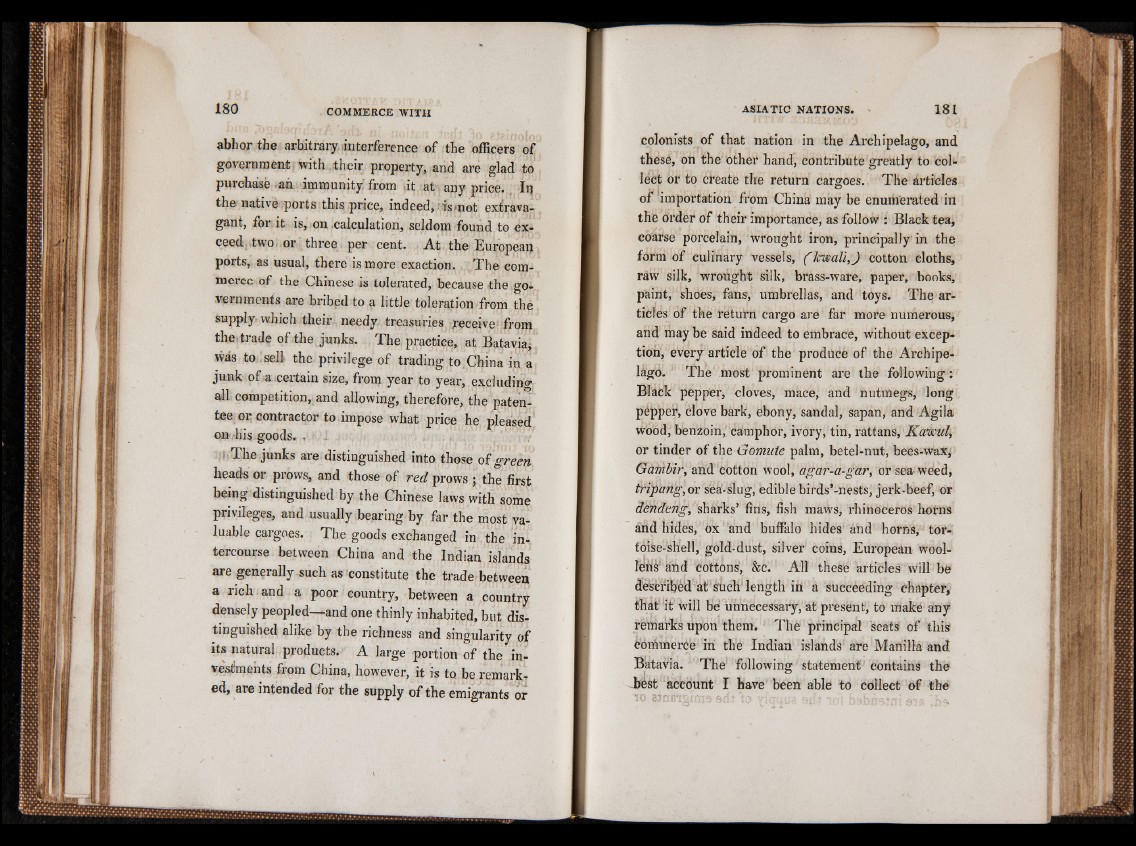
abhor the arhitrary interference of the officers of
government with ,their property, and are glad to
purchase -an immunity from »it at any price. Ip
the native ports this price, indeed, is mot extravagant,
for it is, .on .calculation, seldom found to exceed,
two i or three per cent. At the; European
ports, as usual, there is more exaction. The commerce
of the Chinese is tolerated, because the governments
are bribed to a little toleration from the
supply which their needy treasuries receive = from
the>trade of the junks. The practice, at Batavia*
was to sell the privilege of trading to China in a
junk of a.certain size, from year to year, excliidino-
all competition, and allowing, therefore, the patentee
or contractor to impose what price he pleased
on his goods. . I
¡ The junks are distinguished into those of green
heads or prows, and those of red prows y the first
being distinguished by the Chinese laws with some
privileges, and usually bearing by far the most valuable
cargoes. The goods exchanged in the intercourse
between China and the Indian islands
are generally such as constitute the trade between
a rich and a poor country, between a country
densely peopled—and one thinly inhabited, but distinguished
alike by the richness and singularity of
its natural products. A large portion of the investments
from China, however, it is to be remarked,
are intended for the supply of the emigrants or
colonists of that nation in the Archipelago, and
these, on the other hand, contribute greatly to collect
or to create the return cargoes. The articles
of importation from China may be enumerated in
the Order of their importance, as follow : Black tea,
coarse porcelain, wrought iron, principally in the
form of culinary vessels, (Icwali,) cotton cloths,
raw silk, wrought silk, brass-ware, paper, books,
paint, shoes, fans, umbrellas, and toys. The articles
of the return cargo are far more numerous,
and may be said indeed to embrace, without exception,
every article of the produce of the Archipelago.
The most prominent are the following :
Black pepper, cloves, mace, and nutmegs, long
péppef, clove bark, ebony, sandal, sapan, and Agila
Wood, benzoin,' camphor, ivory, tin, rattans, Koewul,
or tinder of the Gomute palm, betel-nut, bees-wax,
Garnbir, and cotton wool, agar-a-gar, or sea-weed,
tripang, or sea'-slug, edible birds’-nests, jerk-beef, or
dendeng, sharks’ fins, fish maws, rhinoceros horns
and hides, ox and buffalo hides ànd horr^, tortoise
shell, gold-dust, silver coins, European wool-
lefià' and cottons, &c. All these articles Will be
de'scribed at such length in a succeeding chapter,
that it will be unnecessary, at present, to make any
remarks upon them. The principal seats of this
commerce in the Indian islands are Manilla and
Batavia. The following statement contains the
best account I have been able to collect of the